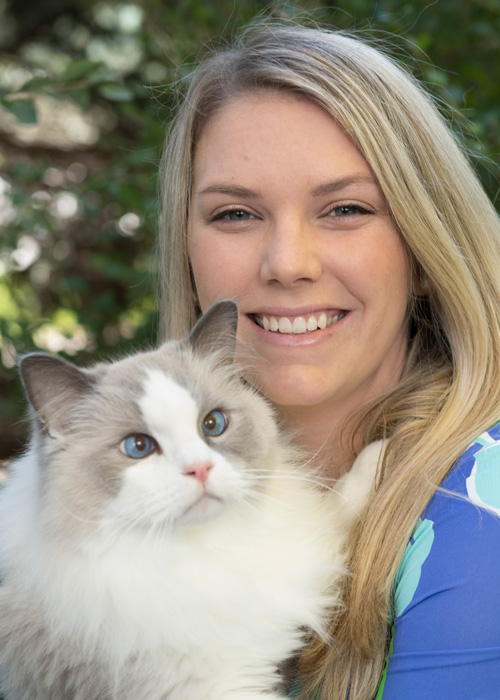
Dr. Brittany Wittenberns, D.V.M.
Medical Oncology Resident
I grew up in Fort Lauderdale, Florida where at a young age I developed a love for the ocean and marine life. I spent summers in the Florida Keys and participated in a camp at the Dolphin Research Center, focusing on husbandry, biology and marine conservation. I entered Boston University, majoring in Marine Biology, and was able to study in both Belize and the New England region.
Prior to high school graduation, my mother was diagnosed with gallbladder cancer. This type of cancer is rare and not usually found until it has become advanced, as was the case with my mom. She underwent surgery, radiation therapy, and received a combination of chemotherapy drugs. At the time I was unable to realize that her diagnosis would lead me to develop a keen interest in cancer pathogenesis, therapeutics, and end of life care, which ultimately evolved into a passion for veterinary oncology.
Following graduation from BU I moved back home to South Florida and took a job as a veterinary technician. After a few months, I was promoted to lead technician and transferred to New York City for the opening of two new clinics. There, I was responsible for the training of new staff, hospital management and assisting doctors in patient care until I was accepted into the University of Florida’s College of Veterinary Medicine, and headed back to the warmer weather once again.
The first two years of the program are in the classroom, and then we go directly into the clinic to get hands on experience. I spent as much time as possible in oncology- multiple elective blocks, vacations, and any other free time I had. The service is modeled after the Flint Animal Cancer Center, with an integrated team of medical, surgical and radiation oncologists, some of whom were trained at CSU. This cohesive approach allows the team to format the best plan for each patient and family, while providing the information in a single visit- which is not something you see in human medicine!
During veterinary school, I was lucky enough to extern at the FACC on two separate occasions. As an influential translational cancer center with one of the busiest veterinary oncology caseloads in the world, I was impressed with the team work between students, technicians and doctors, the wide variety of treatment options available, and the positive interactions with clients given a poor prognosis. I knew at that time that the Flint Animal Cancer Center is where I needed to train to be an oncologist.
After graduating from veterinary school, those who wish to pursue specialty training are required to complete a one year internship. I completed a small animal rotating internship at Carolina Veterinary Specialists in Charlotte, North Carolina, which allowed me to fine-tune my decision-making skills, clinical proficiency, and client communication in preparation for my continued education at the FACC.
When a pet is diagnosed with cancer, the news is often unexpected and survival time may be limited, creating a potentially fragile environment for the animal’s owner and family. While discussing treatment options, owners will often recall a family member or friend who had cancer, how difficult the surgical recovery might have been and how heavy the side effects of radiation and chemotherapeutics can weigh. I know that when I first began my journey to be an oncologist, I had the same thoughts, as I had seen my mother live through it.
I believe a unique opportunity rests with veterinary oncologists centered on a common goal of improving quality of life for the cancer patient and family, sharing information, and listening carefully to make sure the best decision is made for each patient and their family.
When I’m not in the hospital, I like to spend time with friends, relax and explore Fort Collins and the surrounding areas. I also have a Ragdoll cat named Beau who, like me, is a Floridian and is still adjusting to the seasons. Although I enjoy discovering Colorado, I confess that I’ve lived mostly in big cities and am not an outdoorsy person—although I’m trying!